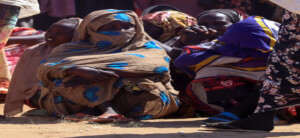Chikungunya fever reported in Sudan’s Kassala
Health authorities in Kassala have confirmed the spread of viral fevers. The medical director of Kassala hospital, Dr Abdel Jabbar, said in a press statement that the hospital has refrained from receiving cases.
 Medical checks at Kalma camp for the displaced in Nyala, South Darfur (Albert González Farran / Unamid)
Medical checks at Kalma camp for the displaced in Nyala, South Darfur (Albert González Farran / Unamid)
Health authorities in Kassala have confirmed the spread of viral fevers. The medical director of Kassala hospital, Dr Abdel Jabbar, said in a press statement that the hospital has refrained from receiving cases.
Doctors said that the fever in Kassala is called Chikungunya*,transmitted by mosquitoes of the Egyptian eugenics, for which there is no cure, with the treatment focused on alleviating the symptoms.
They said the disease is especially dangerous for children, the elderly, diabetics, and heart patients.
The residents confirmed to Radio Dabanga the overcrowding of the health centres in the various districts with patients, where El Borno district health centre is receiving about 150 cases a day.
They explained that the symptoms of the disease include severe fever accompanied with severe pain in the joints and difficulty of movement.
They reported the spread of the disease in the districts of West El Gash and El Halanga.
Strike
The doctors of El Obeid Hospital in North Kordofan entered a strike on Monday and Tuesday in protest against the attack on a hospital doctor by a member of the Rapid Support Forces (RSF) militia.
Witnesses told Radio Dabanga that one of the members of the rapid support militia slapping and kicked a doctor in the surgery department after a discussion between them.
The doctors conditioned lifting the strike with holding the rapid support militia member accountable.
In Khartoum, the Ministry of Health has acknowledged the increase in cases of kidney failure and the lack of medicine for kidney patients, especially Iberks.
The director of the planning unit of Kidney disease and general surgery programme has held the department of medical supplies responsible for the erratic provision of medication.
*Chikungunya Key facts (Source: WHO)
- Chikungunya is a viral disease transmitted to humans by infected mosquitoes. It causes fever and severe joint pain. Other symptoms include muscle pain, headache, nausea, fatigue and rash.
- Joint pain is often debilitating and can vary in duration.
- The disease shares some clinical signs with dengue and zika, and can be misdiagnosed in areas where they are common.
- There is no cure for the disease. Treatment is focused on relieving the symptoms.
- The proximity of mosquito breeding sites to human habitation is a significant risk factor for chikungunya.
- The disease mostly occurs in Africa, Asia and the Indian subcontinent. However a major outbreak in 2015 affected several countries of the Region of the Americas.
Chikungunya is a mosquito-borne viral disease first described during an outbreak in southern Tanzania in 1952. It is an RNA virus that belongs to the alphavirus genus of the family Togaviridae. The name “chikungunya” derives from a word in the Kimakonde language, meaning “to become contorted”, and describes the stooped appearance of sufferers with joint pain (arthralgia).











 and then
and then